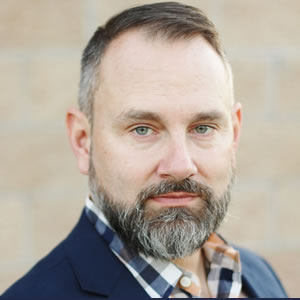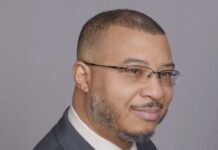Austin Bonderer Podcast Transcript
Austin Bonderer joins host Brian Thomas on The Digital Executive Podcast.
Brian Thomas: Welcome to Coruzant Technologies, home of The Digital Executive podcast.
Welcome to The Digital Executive. Today’s guest is Austin Bonderer. Austin Bonderer is a seasoned Patent Attorney. With over two decades of experience, Austin’s impressive portfolio, boast over 700, issued us patents, underscoring his expertise and dedication to the field.
Before his distinguished career as a patent attorney, he honed his skills as a US patent examiner for the US patent and trademark office. Austin’s professional journey has also taken him across the globe, enriching his perspective in broadening his knowledge. His extensive experience and international exposure make him a knowledgeable asset in the world of intellectual property.
Notably, Austin also led the US Nanotechnology prosecution for a Forbes World 100 company. Today, Austin is the principal at the law office of Austin Bonder pc, where he specializes in obtaining patents for his clients. His extensive experience and international exposure make him a valuable asset in the world of intellectual property.
Well, good afternoon, Austin. Welcome to the show.
Austin Bonderer: Thanks for having me, Brian.
Brian Thomas: Absolutely, my friend. I appreciate it. We’re in the same time zone today. You’re in southern Alabama. I’m in Kansas City, but I love jumping on a podcast first thing every day. That’s just what I do and it really gives me that, that juice for the day.
So, jumping into your first question, Austin, you began your career as a patent examiner at the USP really patent and trademark office. How did that experience shape your ladder work as a patent attorney? What insights from. The insight do you bring now when you argue for or draft patents for clients?
Austin Bonderer: I think probably one of the biggest takeaways that I had is, is that it’s as much a relationship business as it is a technical argument type of business.
While there’s only one patent office, there’s really like 8,500 because each patent examiner is their own patent office. And so what I basically learned is that you really. It behooves you to call to talk to them, to treat them like people as opposed to just making technical arguments all the time, because they all have different paradigms and you have to work with each one individually on your case.
So what I really learned was is that you need to work with them. And talk to them and find out exactly what, where they’re coming from. Because oftentimes, I mean, you’ve probably done it with emails. I mean, you’re basically doing these writings back and forth. You may be just going over each other’s head, missing the point that each one of you is trying to make.
So the other part that I would say is that when people call me and they’re like, Hey, I’m looking to get into this, the experience as a patent examiner I think is invaluable because it takes time to write a patent application. It’s much harder to prosecute a hundred patents when you’re actually writing them, but as you’re a patent examiner, you might do one or two cases a day.
So all the different issues that come up while you’re working as a patent examiner, you’re getting exposed to because you’re just examining, you’re reading. And arguing. That way you don’t have to spend the time writing the application, and so it gives you a lot more experience on how to deal with the intricacies or, there’s a reason why they call it a practice because there’s so many little things that can happen and weird variables.
I mean, what is the favorite thing that a attorney always says to you? You ask ’em a question and they say, it depends, right? Because everything is very specific and fact oriented When you’re an examiner. You get so many more cases before you that you’re able to encounter those problems or those little issues and learn from them in a much faster timeframe than you would if you were on the outside a patent attorney writing those applications and then prosecuting them before the office.
Brian Thomas: There’s a lot that goes into that, and I appreciate you sharing that. I practice is, is a great term. I kind of use that on the podcast. I learn something new every day and I truly do. It’s amazing here, but I like how you highlighted that this is a relationship business, and I agree with you a hundred percent.
I think everything should be more human interaction versus email. Things get so lost in emails and other types of, you know, face-to-face or, or phone calls. So I appreciate that. And Austin, the next question here, with over 700 patents to your name as an attorney or examiner, how do you maintain high standards of novelty, clarity and enforceability while managing so many filings?
What processes or disciplines help you avoid sloppy patents?
Austin Bonderer: Well, I mean, I would say managing all these applications, what has been the greatest? Helper of any office, it’s software. So we specifically have software that helps maintain. So when the office or the patent office sends us a rejection or some kind of letter, it automatically goes into our docketing system and we know when those deadlines are, and that’s kind of how that works.
Now, how you know, to maintain quality of the patents that I write and prosecute, I mean, honestly, I’ve been doing this since. I got outta engineering school in 1999. I’ve either been reading a patent application every day or writing a patent application every day, and I don’t want to say that it’s become, second nature in that I’m not paying attention, but I know what works at this point in time.
Been doing it for over 25 years at this point. So. I would say that just the experience of writing these things, arguing these things, seeing the holes in the arguments, I mean, there’s a lot of times that. With this experience, you can tell if the examiner is making, is truly believes in the rejection that you’re, they’re making, they made it ’cause their boss told ’em they need to show some kind of work.
Or sometimes you can tell it’s just for training purposes and it’s just that kind of experience over time that I think enables me to really prosecute patents in a good way, I would say we all have certain aspects of our job that we’re better at or worse at. I would say where I really thrive in my business or my practice is the arguing with the office or trying to work with them to get a patent through.
Brian Thomas: Wow, that’s amazing technology. We obviously highlight that here on the podcast and entrepreneurship, but software is the key for just about everything now, helps manage and maintain those patents. You said you talked about receiving tracking deadlines, et cetera, et. Your experience is amazing. Reading, writing and or arguing a patent application every day for the last 25 plus years is no small feat.
And my hat’s off to you for sure. Thank you. And Austin, my next question here, what are the most common missteps you see among startups pursuing patents like over patenting, under budgeting, MISP prioritization? If you were advising a tech founder today, which I talk to a lot every day here, what’s the minimal viable IP strategy they should have?
Austin Bonderer: Well, the first thing I tell anyone is that disclosure kills patents and it kills businesses to tell you the truth. I mean, what you really need to look at is. You need to keep everything under wraps and patents protect your ip, but you know, often overlooked as NDAs. It’s much easier to sue under an NDA than it is a patent.
It’s a much clear cut case. I disclosed something to you with the promise that you wouldn’t disclose it and you did. That’s a much easier contract claim to prosecute. But you need the, you need different layers, you need your patents, you need your NDAs. One of the other things is that they need to realize is that.
A lot of these startups, we always hear it. The true asset of the company goes home every day at five, right? So you actually do need to spend time and money on your corporate SOPs in order to maintain and make clear that the IP that you have or the trade secrets or you know everything that you’re working on belongs to you and your employees can’t take it with them.
And so you need an attorney to help you with your patents. You need an attorney to help you with your NDAs and you need to help in have them help you with your, employee handbook and SOPs. Now that being said, an attorney can attorney, basically just eat your entire budget because we tell you these, all these things that need to be done.
You do have to pick and choose where you’re gonna spend your budget because at the end of the day, especially for startups, cash is kink. So I try to work with my clients and say, Hey, we might be able to hold off on this, but this is something you definitely need to do. This is what you need to keep an eye at towards.
So it’s really kind of hard and it’s very specific to each kind of business, because software businesses, they’re not getting patents anymore for the most part. Right, so their IP needs to be so focused on maintaining trade secrets and know-how, and employee handbooks and NDAs.
Brian Thomas: Thank you. I appreciate that.
Yeah. There’s a lot here that you unpacked around disclosure, right? As you mentioned, that it can absolutely kill a patent or a business, and that’s important. You talked about NDAs, they’re key to protect that ip and we have people like you in the world who help us protect our ip. That’s so, so.
Important, especially in this business as I talked to a lot of people in the technology world startup world and there’s just a lot of that going on. So thank you. And Austin, the last question of the day. As fields like ai, biotech, software and hardware converge, how has patent law evolving or failing to evolve?
What changes in jurisprudence, patent office policy or legal doctrine would you like to see to better accommodate tomorrow’s innovations?
Austin Bonderer: Well, the biggest thing that US patent practitioners are dealing with and software’s dealing with is that in 2014, the Supreme Court came down with this ALICE decision and basically at the end of the day, it killed all software, most software patents.
There are some that can get through and they have to pass this extremely complex test that, I speak with my colleagues, I’m like, do you still fully. Understand this test, and they’re like, no, it can go one way with one patent examiner and it totally, sideways with a different one. So right now we’re having an issue because basically what I tell people is that if you have a generic sensor, like a medical sensor, or you’re testing blood, or you’re doing all this other kind of stuff and then you use software to analyze it, you can’t get a patent on it.
So the Alice decision is not only kind of. Destroyed software patent industry. It’s also destroyed a lot of diagnostic testing. So right now we’re in kind of limbo and it’s hard for medical innovation to move forward if we can’t get patents on it because people do not invest in these expensive medical products.
If they could develop the market and then someone sees that you did really well, they’ll just come up behind you and do the same thing. So. It would be nice if Congress or the Supreme Court would clarify, what software is actually patentable and then what is not. And we’ve asked them to do it a million times, but at the end of the day, Supreme Court hates dealing with.
Patents as most judges do, because most judges didn’t go to engineering school. And so that’s what we’re dealing with. And then Congress hasn’t really touched it either, and we’re all kind of in limbo on this, and I really would hope that they do that. Now, the other part of your question that’s, of course ai, this is the big new one for our industry.
One. Only natural persons can be inventors. So if you’re using AI to help you invent, I have, there’s two possible issues with that. One, if the AI actually comes up with the inventive concept, no one can get a patent on it. So you might apply. And then in litigation later, they’re gonna be like, how much did AI help you with this?
And if you tell ’em the truth, like it pretty much did all of it, they’re gonna invalidate your pat. My other issue with AI is that, like I said before, disclosure kills patents. Disclosure kills businesses, and I know that they say that there’s some kind of wall with the information you’re putting into this ai, but at the end of the day, if you ask me, you’re telling this.
The largest knowledge database out there, your ideas. And technically to me, that’s considered public disclosure. Now the courts haven’t really weighed in on this yet, so it’s kind of unknown, but I’m not gonna put my clients out there at the forefront to figure it out. So once a court tells us what ai, disclosure means, and if it’s considered public disclosure, I tell my clients to stay away from it.
Brian Thomas: Great advice. Thank you so much. Gosh, there’s so much here. So I can see you mentioned the Alice decision in 2014. Obviously that destroyed the software industry as far as patenting, and that was obviously a struggle. And when as you brought up earlier. Judges, people in Congress, lawmakers, legislators, they just don’t wanna touch it if they don’t have that background.
And I kind of get that. You did talk about though AI and it is hard to patent that stuff and I’m glad that you’re sharing that with us here on the podcast with, because we do have a lot of owners, tech founders, entrepreneurs and attorneys that listen in and this is very helpful. So I appreciate that.
And Austin, it was such a pleasure chatting with you today and I look forward to speaking with you real soon.
Austin Bonderer: Thank you very much, Brian. I enjoyed being on the podcast.
Brian Thomas: Bye for now.
Austin Bonderer Podcast Transcript. Listen to the audio on the guest’s Podcast Page.











